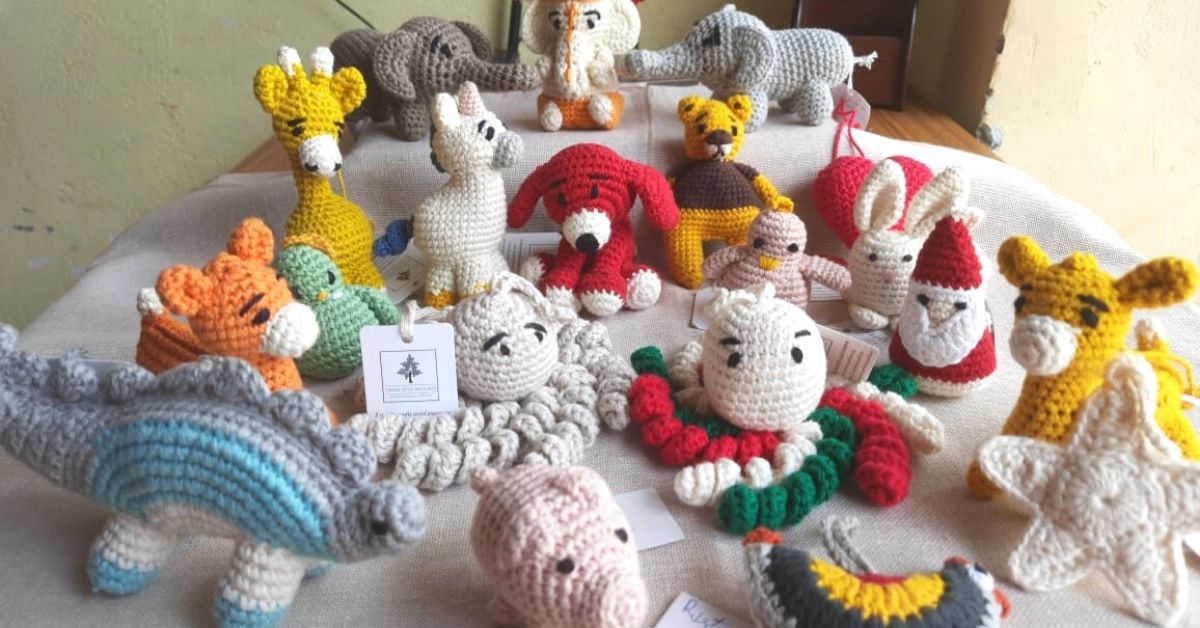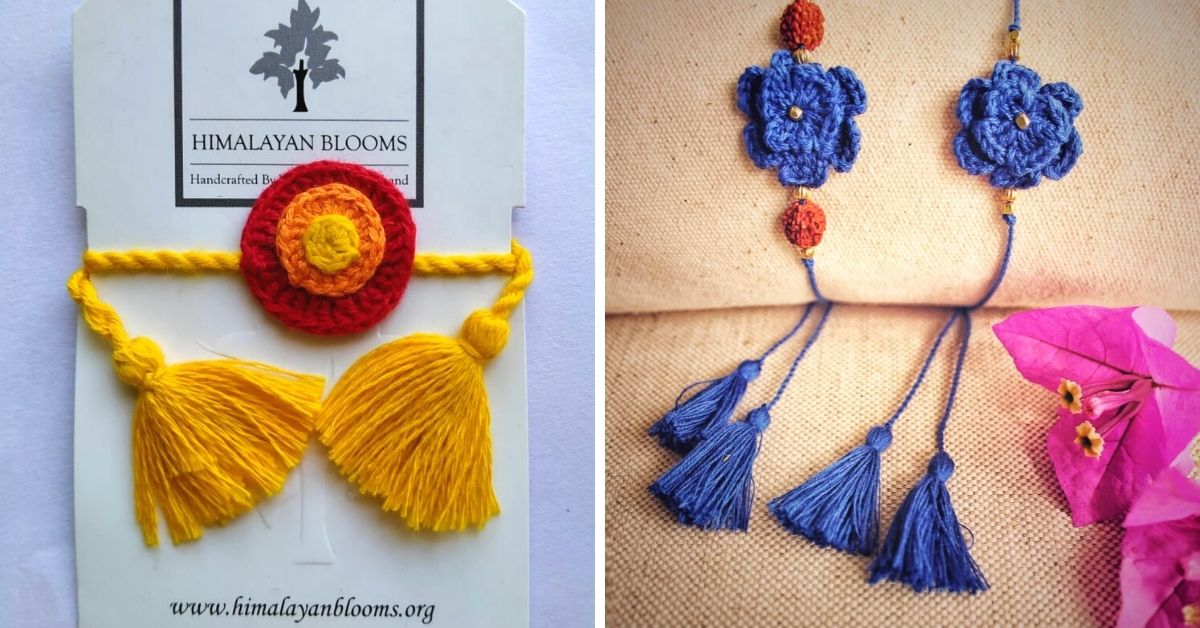In 2006, Bengaluru-based Pratibha Krishnaiah graduated with a degree in computer science. She got a corporate job, which she worked over the next eight years. She says the salary was good, she was excelling in her field, and things were going well.
However, she felt like she needed a break.
So Pratibha signed up for the State Bank of India’s Youth for India Fellowship (SBI-YFI) in 2014. This programme offers India’s young talent a chance to connect with rural communities and enables the participants to work on development projects with experienced NGOs. Little did she know that the event would change her life entirely.
Pratibha moved to Khetikhan village in Uttarakhand for a 13-month fellowship to work with an NGO working with rural communities.
As she settled and started acclimatising with her new life, she observed that a yarn of wool and knitting needles accompanied the village women at all times. “Be it a neighbourhood meeting, a family event, social gatherings, or merely spending time at home – women knitted woollen sweaters, socks, scarves and other items at all times,” she tells The Better India.

The 37-year-old says that speaking to these women helped her learn that knitting was being pursued more as a hobby and for personal or family use, but the products were not being commercially sold.
Giving village women something to believe in
So Pratibha decided to rope in women and help them earn money out of a hobby. She approached these women and shared her idea. She suggested that she’d buy their products and sell them.
But Pratibha was not well-versed with knitting and had to take lessons from locals and YouTube. Language was another hurdle she had to overcome for effective communication.
Initially, she managed to win the confidence of ten women. Once these women earned money and had faith in Pratibha, they realised that earning income from their skill could be a reality and not just fantasy.
Slowly, more women joined, and they named the venture Himalayan Blooms, which sells knitted and crochet items through the website and off-line market.
In 2015, Pratibha finished her fellowship and returned to Bengaluru. “It was around that time an article was published about my work. I received over 100 emails appreciating my work. Out of them, 95 were full of praise while the remaining persons expressed willingness to support the cause,” she explains.
Pratibha says one particular NRI, Joginder Kundra, seemed very passionate about the women’s work and wanted to support them monetarily. “The 70-year-old man lived in the US and agreed to start a fundraiser. But I had not planned to stick around to see how the future of the venture would pan out – I was just going to hand the project over to the NGO. I also wanted him to visit the women before he invested in them. He flew from New Jersey and spent ten days understanding their work. He decided to support them,” she says.
She adds that the NGO cited a lack of expertise for not accepting her project. So Pratibha had a decision to make – stay and see the venture through, or leave and start afresh.
Pratibha says that deciding the fate of her project was a difficult decision to make. “I recalled my time in Uttarakhand, and one particular incident touched me. During my stay, the women used to suggest that I travel and enjoy my time in the valley instead of trying to work with them. They said that many NGOs came and worked for months and disappeared. ‘Such initiatives don’t last for long,’ they had said,” she says.

“I was shocked to hear the reality of these non-profits and decided that it was time to change it. I went to Uttarakhand in February 2016 and decided to take up the business until it self-sustains,” she says.
Pratibha worked closely with the women and visited her home in Bengaluru only twice a year. She trained the women in all aspects of the business. At present, there are over 200 women across 40 villages who are part of the cause, earning between Rs 7,000 and Rs 10,000 a month. The orders are accepted online and sold across India and other parts of the world. The business fetches a revenue of Rs 15-20 lakh per year. Pratibha takes an honorarium of Rs 10,000 every month to meet her expenses.
‘Nothing that a woman can’t handle’
Meena Bhat from Khetikhan, who is part of the initiative, says, “Earlier we used to see Pratibha walking down the streets, and she was curious to know about our lives, daily struggles and aspects of livelihood. She learned about knitting, suggested a business model and handed over yarns to each woman.”
Meena says that once the first batch of women started earning, more joined. “We now have a workshop which doubles up as an office. We handle business, accounting, bookkeeping, accepting orders and deliveries,” adds the 28-year-old.
She says the business has multiplied more than they expected. “We used to knit and crochet 10 kilos of wool a day. Now it has increased to 100 kilos. The women from our village never thought of monetising the skills and should have pursued it before. During the festive season, we earn up to Rs 15,000-20,000,” Meena adds.
Meanwhile, Kusumlata Oli, another woman who is part of the venture, says her husband is unemployed, and earnings from crafting helps the family meet their children’s education fees and daily expenses. “I feel proud and glad to be financially independent and be able to run the house,” she says.
She says the business has given them confidence and taught the women many aspects of life. “We have learned time management as we handle house chores and the business simultaneously. Many women from the village thought it was challenging to balance. But we have shown that it can be done, and inspired others to join. They also observe how we handle house expenses and become successful. The women feel that if we can succeed, they can as well,” she adds.
Kusum also says the women want to scale up the business and expand the market.

Meanwhile, Pratibha says that she has started focusing on the same. “I am planning on taking the business to a level where it self-sustains and am chalking out an exit strategy. COVID-19 has been a blessing in disguise as the women handled all the aspects of the business efficiently in my absence for six months during the lockdown,” she says.
She says that the women handle the website, Instagram, Facebook page, click pictures and promote the products. “I will stay until the business functions smoothly and hand over the reins to the women. The transition is already in the process, and we hope for some support from the government,” she adds.
She notes, “I do not have plans for now and like living in the moment. I love rural life. So I’m definitely not going for a corporate job, but probably to another village and remain off the grid.”
To order from Himalayan Blooms, you can email them at himalayanblooms@gmail.com or visit their website.
Edited by Divya Sethu
No comments:
Post a Comment